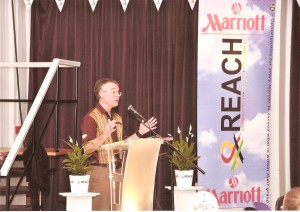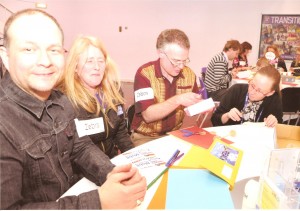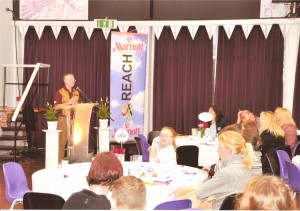 Chris Mitchell the author of new JKP title Mindful Living with Asperger’s Syndrome and Asperger’s Syndrome and Mindfulness discusses how approaches to autism within education have changed over the last 20 years.
Chris Mitchell the author of new JKP title Mindful Living with Asperger’s Syndrome and Asperger’s Syndrome and Mindfulness discusses how approaches to autism within education have changed over the last 20 years.
A diagnosis of Asperger’s Syndrome, especially if obtained in adulthood, can be seen as a new start. But in reality, each day after diagnosis is a new start in itself with the different challenges that each day brings. As individuals, what people on the autistic spectrum have in common with those who aren’t is that we are on a journey but where we differ is that our routes to our summit (what we want from life with regards to happiness, achievement etc.) are dramatically different.
Revisiting my former school on World Autism Day, twenty years after leaving, I found that this ethos of new starts and different journeys is being applied to change the concept of achievement, as well as to help build a communication platform between the school and parents. When I was a pupil at Monkwearmouth School (now an academy) in Sunderland in the early-1990s, autism itself was still little heard of within mainstream schools. In the last five years Monkwearmouth has developed an Additional Educational Needs (AEN) department, which provides support for pupils with SEN, including pupils on the autistic spectrum.
The mantra of the AEN is for its pupils to start with the abilities that they already have, and gradually building on them, hopefully leading then to uncover capabilities that they may have that they were perhaps previously unaware of. Starting with what you can do may involve, for instance, if a pupil has difficulty with maths, there isn’t any point in introducing them to advanced maths but rather focus on what they can do within maths, perhaps basic computation of sums, before learning how to apply mathematical formulae to problem solving. Similarly, if a pupil has difficulties with English Language, rather than writing an essay, it may help to work on sentence and paragraph construction before, so they can apply it to writing an essay.
 As well as academic support, the AEN also provides pupils with recreational activities to help develop both confidence and resilience. Rather like I feel my mountain treks have helped me with my social skills in trekking with a team, facing each day as a new challenge, residential experiences can help pupils on the autistic spectrum in this way so that they can find security within and generally get the best out of the social aspect of school.
As well as academic support, the AEN also provides pupils with recreational activities to help develop both confidence and resilience. Rather like I feel my mountain treks have helped me with my social skills in trekking with a team, facing each day as a new challenge, residential experiences can help pupils on the autistic spectrum in this way so that they can find security within and generally get the best out of the social aspect of school.
An increasingly important aspect of the AEN is the support that it now provides to parents through the REACH agenda with a series of conferences and awards evenings. Unlike traditional school awards for best performance in a particular subject, REACH Awards are given for overcoming barriers to achievement, while at the awards evenings there are also fun activities for parents to join in with, thus helping improve staff-parent relationships. It is well-documented that parents of young people on the autistic spectrum can feel stigmatised by others who see that their child presents differently to their peers. This can lead to a lot of stress which can reflect on their child or young person, making their life both at and outside school very difficult. Which is why the awards offer more than just a celebration of what pupils have achieved and help to build positive relations between staff and parents, and also between parents themselves, helping them get to know one another through doing something that is fun with others who share and cope with similar experiences.
Having seen similar approaches in other schools I have visited to give training, coming back to Monkwearmouth after 20 years away and seeing how much the emphasis has changed was like coming back to the place from where a long journey started. Named after the monastery where Benedict Biscop lived and worked during the 7th century, Jarrow-Monkwearmouth became a great centre of learning for its time. It was fantastic to see that the school is continuing this tradition by making learning so much more accessible to those with additional needs, including making achievement possible for many rather than just a gifted few.
 Special thanks to Suresh Patel, SENCo at Monkwearmouth for his enthusiasm, hard work and organisation of the REACH event and for the photographs. Elsewhere, I am back at the Great North Run this year, this time running for the National Autistic Society’s Newcastle Gateshead Branch. You can visit my sponsorship page at http://www.justgiving.com/Chris-MitchellGNR2014
Special thanks to Suresh Patel, SENCo at Monkwearmouth for his enthusiasm, hard work and organisation of the REACH event and for the photographs. Elsewhere, I am back at the Great North Run this year, this time running for the National Autistic Society’s Newcastle Gateshead Branch. You can visit my sponsorship page at http://www.justgiving.com/Chris-MitchellGNR2014
Chris Mitchell is the author of Mindful Living with Asperger’s Syndrome and Asperger’s Syndrome and Mindfulness both published by Jessica Kinglsey Publishers